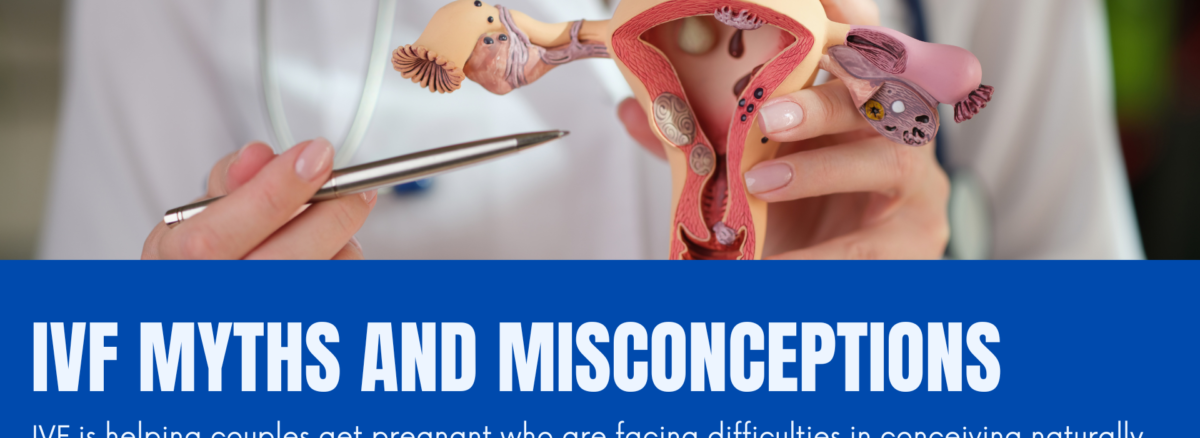The IVF method of conceiving has helped millions of parents experience parenthood. An amazing technology that is making couples all across the world happier has been prey to several myths and misconceptions. These IVF myths often put fear in the couple’s mind about going for the treatment.
The breakthrough treatment, which began in 1978, has gone through several developments. While it’s still evolving, we are here to share some common myths and misconceptions about the technology, the process, and its outcome.


What is In-Vitro Fertilisation (IVF)?
In-vitro fertilisation (IVF) is an innovative technique which involves removing a woman’s ovaries and fertilising them with sperm in a laboratory. Once the egg fertilises and forms the embryo, the same is implanted in the womb, where it can grow and develop into an infant.
This way, IVF is helping couples get pregnant who are facing difficulties in conceiving naturally. IVF treatment is recommended for couples who have been trying to get pregnant through unprotected coitus for at least two years.
There are several other criteria for getting the IVF treatment, which your gynaecologists will help you understand.
10 IVF Myths and Misconceptions | Debunked


IVF is Suitable only for Infertile Couples
IVF, as a treatment option, was discovered to couples who cannot conceive naturally. However, it’s not that only infertile couples can take the benefit of this treatment.
Any couple who chooses to get pregnant through artificial methods can use this treatment option. Men and women with a genetic disorder, which can potentially affect the baby’s health and longevity, can also take this option for getting pregnant.
Within this, another myth we have heard is that IVF is the only way to conceive after a couple faces issues with conceiving naturally. That is also not true. IVF isn’t the only treatment, and there are other options like Intrauterine Insemination (IUI) or timed intercourse cycle. To choose the right treatment, you must consult a gynaecologist.
IVF has a 100% Success Rate


This is also one of the IVF myths that you might have heard from others or also seen in advertisements and hoardings. Indeed, the treatment has proven to be effective in the majority of cases, but there is no guarantee that it will always lead to a favourable result.
The success rate of IVF treatment depends on a variety of factors. These include;
- Age
- Weight
- Hormonal health
- Presence of chromosomal abnormalities
- Quality of egg and sperm
Even if all these factors are in the favour of the couple, no IVF expert can guarantee the results. Yes, it is a scientific process which has been tested. Still, there is scope for errors, which can lead to unfavourable results.
IVF Can be Done at Any Age


Those who claim that IVF can be done at any age must understand that for the IVF treatment to be successful, a woman’s womb has to have good health. A healthy womb will ensure the transference of all the required nutrients to the infant until the time it is ready for delivery.
The legal age in several countries for IVF treatment is 50. The UK has set the age limit to 43, and Canada has set it at 49. The success of the IVF treatment is dependent on other factors, which include a woman’s age.
With IVF, a Woman Gives Birth to Twins or Multiples
This IVF myth is true to some extent. However, the IVF process in itself does not lead to multiple pregnancies at one time. Giving birth to twins or multiples through IVF can happen during the transfer of embryos to the uterus. Doctors can take this risk in the name of increasing the chances of success, but one embryo transfer in IVF has proven successful the majority of the time.
Moreover, one embryo transfer is safer for the baby and the expectant mother. Those who wish to get multiple embryo transfers can undergo elective single embryo transfer (eSET).
This analyses the patients who wish to have two embryos transferred to their uterus. Doing the analysis can help increase the chances of getting pregnant as it evaluates the uterus health and checks several other factors.
IVF Babies are Unhealthy


Another one of the disheartening IVF myths which makes rounds and is completely incorrect. Until today, we have helped several couples enjoy parenthood through IVF and never have we seen an infant born through IVF manifest any health issues.
The health issues a baby may develop after birth due to several other reasons is a different matter. But saying that a baby’s immune system is underdeveloped in IVF or the baby will get sick more often is not true.
For couples still not sure about the results, they can consult an IVF expert at Santokh Hospital. Among other things that the experts suggest and recommend, the couple can undergo a preimplantation genetic testing (PGT) process. This will help them know about issues before IVF implantation. It can help the experts determine reasons for previous miscarriages (if any) or detect genetic issues, especially those linked with chromosomal abnormalities.
Taking the IVF Option Increases the Risk of Developing Cancer
When we are busting IVF myths, another one is cancer development due to IVF. Studies have been done to find any link between cancer development and IVF, and no study has found any significant increase in cancer in individuals who have undergone IVF procedures.
Although there is evidence to prove that women who have infertility have a baseline increased risk of cancer. However, this risk is related to genetic factors and not any fertility treatment, especially IVF.
However, if you still have concerns which are well founded, you can always consult your IVF experts to understand all the potential risks of the treatment.
One Failed IVF Cycle Means a Domino of Failures


An IVF cycle can fail for several reasons, but that does not mean that all the next cycles will also fail. It can happen for reasons unknown without proper inspection that two consecutive IVF cycles can fail.
But when consulting an expert, they will find the cause of failure in the previous cycle to ensure that the same does not happen in the next ones. Still, the success of an IVF cycle depends on several biological and hormonal factors.
Hence, proper inspection and tests must be done by the fertility doctor to assess the reasons for failure and curate an effective treatment plan to minimise the risks in the next cycles.
IVF is the Only Way to Treat Infertility
Infertility can be caused due to several reasons, and it is not true that IVF is the only treatment. It depends on the fertility doctor you consult to find the reasons for infertility. Sometimes, other lifestyle and health factors can also lead to infertility.
Hence, instead of going for IVF treatment, fertility doctors can also suggest reducing stress, reducing weight, and making positive lifestyle changes. At times, medication is enough to treat male or female infertility. There are supplements available to improve egg and sperm quality, which can result in successful conceiving.
Other treatment options include intrauterine insemination and conducting minimally invasive surgeries to address endometriosis and uterine fibroids. So, IVF isn’t the only option to get pregnant.
Eat Pineapples; It Will Improve Embryo Implantation


A lot of fertility-related blogs will say that eating pineapples is good for embryo implantation. Unfortunately, this is not true. They recommend eating pineapples as they are a good source of an enzyme called bromelain.
Some theories claim that bromelain has anti-inflammatory properties, which helps with implantation. However, we have not found any clinical evidence linking pineapple with improvement in embryo implantation. So, you can continue to eat pineapple, but not for the sake of improving embryo implantation.
Infertility is only a Woman’s Issue
Another one of the IVF myths is that it only affects women’s reproductive system and hinders their ability to get pregnant. However, that’s not true. Infertility, as a condition, can be manifested in any gender.
Where a woman’s capability to get pregnant reduces with age, the same principle applies to men. With age, the sperm quality and quantity can decrease, which can give rise to infertility.
Conclusion
Infertility is a stressful condition for the expecting parents. The lack of having a child together can quickly result in a stressful life, especially for the couple who dearly wants to have a kid together. While there are several causes that can lead to infertility, rest assured that there is proper treatment for the majority of the issues.
IVF is one of the treatments we opt to treat infertility and help a couple fulfil their dream of becoming parents. At Santokh Hospital, we have an advanced IVF facility for testing, processing results, and implantation. Our IVF experts are always here to help you get all the right answers and solutions. Get in touch with us to know how we can help you enter the beautiful stage of parenthood.

